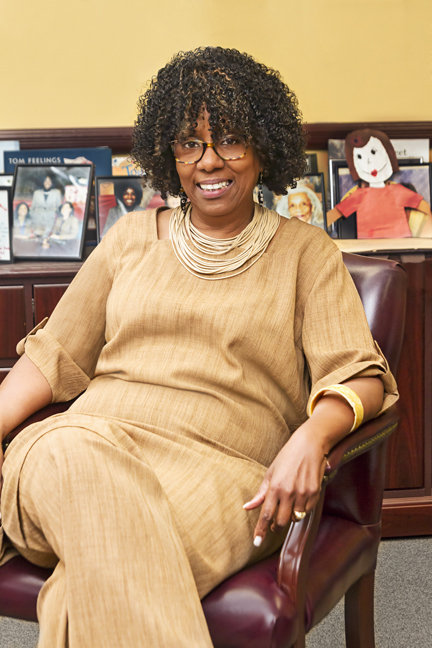The office of Dr. Marcia Lyles is not for show; it’s for work. Which is why this “Hanging Out With” feature doesn’t take place in the customary café or watering hole. Lyles is pretty busy. The opened files on her desk bespeak a person who has her nose to the grindstone. The walls display photographs and honors, symbols of accomplishment that add to the sense that Lyles is not only cutting a new path but building on what has been accomplished in the past.
A confirmed Trekkie, she is the owner of two Star Trek Pez gift sets, which have pride of place in her office.
For Lyles, who was named superintendent of the Jersey City school district in 2012, the job is mentally and physically demanding.
“I try to put my foot in every school,” she says. This “meaningful experience” allows her to gain firsthand knowledge of the successes each school has enjoyed and the challenges each one faces.
Scaling Down
Lyles is a big promoter of the community-school concept, which she says provides an important learning environment in which parents, teachers, and administrators all play a role—support the whole child by working with parents.
Lyles believes in small learning communities within large public schools, allowing for personalized learning that creates a bond between students and teachers.
She developed the concept as a high-school principal in New York City and has brought it to Jersey City.
While smaller high schools don’t need such programs, larger ones do, becoming self-contained schools within schools. Examples include an entire floor of Dickinson High School, and a wing at Ferris High School.
Many schools develop their own niches, focusing on specific themes, such as PS 20, which has a strong literary emphasis.
“When I go into a school, I generally ask who they are,” Lyles says, noting that the answers often define the goals and aspirations of a community and how it sees itself.
Some schools need more attention than others.
Historically, PS 15 in the southwest section of the city has faced significant challenges. Ninety-five percent of students qualify for the free or subsidized lunch programs, which means they are at or below federal poverty levels.
“This poses some great challenges,” Lyles says.
Parents and Peers
Her philosophy of teaching the whole child encompasses the belief that all children are created equal; she makes a point of listening to everyone, from educators to parents and grandparents. She has enormous respect for grandparents who raise their grandchildren.
“They not only raised their own children, but now are doing it again,” she says. “This is their second time around.”
Lyles often attends parent teacher organization meetings. If she doesn’t, someone from her team does.
She’s also a firm believer in the power of peers and has set up peer groups in Dickenson and Lincoln high schools, where upper class members become mentors for incoming freshmen. Many students struggle with the transition to high school. Peer mentors can help set the tone for the entire high-school experience.
Peer groups teach skills such as conflict resolution and problem solving, which students will need long after they leave high school.
Knowledge is Power
Lyles knows the education system from the bottom up.
She grew up in Harlem, where she attended a public elementary school. When her mother died young, Lyles went to live with relatives, bouncing around the New York City school system, until a teacher inspired her to become a teacher herself. She decided to teach English.
She originally attended Benjamin Franklin High School, largely populated with black and Hispanic students. But like many inner-city schools, it was not challenging. She found she could pass without actually attending classes.
“I was an honor student, but they didn’t expect a lot of me,” Lyles says.
Her aunt asked that she be transferred to Jamaica High School at the end of her sophomore year. Here, she found herself in a school with mostly white students, where she had to work to keep her grades up.
“Jamaica had a different population and different expectations,” she says, noting that she learned a valuable life lesson early on about expectations and access to resources.
“Not all schools are the same,” she says. “Some are not as supportive as others. Students need to have access to resources, and sometimes you have to do more to help them provide that access. Fortunately for me, I did well in school.”
Lyles graduated from Jamaica High School in 1965.
She went on to SUNY Fredonia and then transferred to Hunter College, where she graduated cum laude with a degree in English.
If You Can Make It There…
Lyles went on to teach English at a high school in Manhattan, but was laid off in the 1970s due to budget cuts.
After that she worked at every level of the New York City public school system: English teacher, assistant principal, principal, superintendent, and eventually deputy chancellor. She helped turn around test scores during her term as superintendent in Brooklyn, something she recently achieved in Jersey City as well.
She was also CEO of a school support organization, which may explain her strong belief in the importance of parent-teacher organizations.
“I believe in grassroots and parents who are advocates for their children,” she says, noting that she meets quarterly with parents.
“They tell me how it is,” she says. “No holds barred. It’s a dose of reality when they tell me what’s on their minds.”
Lyles persistently promotes the idea that kids, even in the poorest neighborhoods, can aspire to college—just as she did.
She has always been conscious of the gap between the performance of white students in the school system and students of color.
“Not every student is at the same place,” she says. “Not all get the same level of support, but we have to make sure they get access to resources, which means we have to do more for some students.”—JCM
